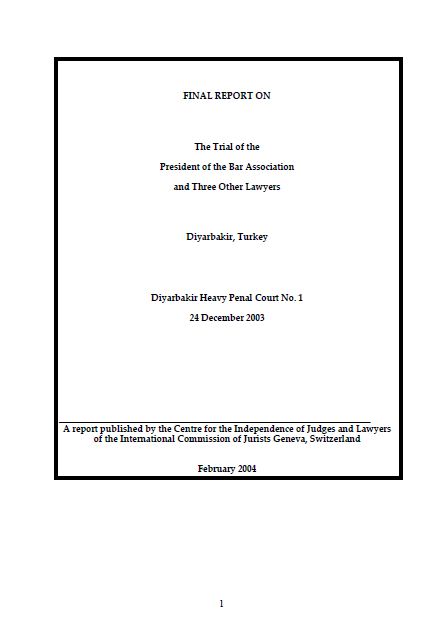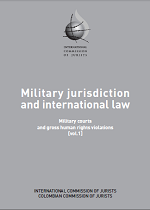
Jan 7, 2004
 The trial of the President of the Diyarbakir (Turkey) Bar Association and 3 other lawyers who were charged with “professional misconduct” for having represented evicted villagers did not conform to international standards.
The trial of the President of the Diyarbakir (Turkey) Bar Association and 3 other lawyers who were charged with “professional misconduct” for having represented evicted villagers did not conform to international standards.

Jan 1, 2004
Este estudio, realizado por la CIJ y publicado conjuntamente con la Comisión Colombiana de Juristas, aborda el problema del enjuiciamiento de militares y policías autores de graves violaciones de derechos humanos por tribunales militares.
El estudio hace un inventario de las obligaciones internacionales de los Estados en materia de investigación, enjuiciamiento y reparación por graves violaciones de derechos humanos así como una presentación sistematizada de la jurisprudencia y doctrina internacionales sobre la cuestión enjuiciamiento de militares y policías autores de graves violaciones de derechos humanos por tribunales militares (Primera parte). El estudio muestra la evolución y las tendencias mundiales en materia de jurisdicción militar, particularmente en 30 países (Segunda parte).
Un segundo estudio, sobre los civiles ante los tribunales militares, será publicado a finales de 2004.
Military Jurisdiction-publication-2004-spa (full text in Spanish, PDF)

Jan 1, 2004
During the past year, the ICJ has proceeded to tackle vigorously certain of the manifold challenges presently confronting the international human rights movement.
The threat to the primacy of fundamental rights posed by counter-terrorism measures, the dereliction of many States in adequately implementing the human rights obligations they have undertaken; the struggle to preserve a rule of law undergirded by the functioning of an independent and impartial judiciary; and the tendencies towards the overall weakening of universal and regional systems of human rights protection. This Yearbook is intended to serve as a conduit for dissemination of information, analysis and guidance to jurists, governments, NGOs and the wider human rights community for use in their own efforts to address these challenges.
ICJ Yearbook 2004-ICJ yearbook-2004-eng (full text in English, PDF)

Jan 1, 2004 | News
Cette étude, réalisée par la CIJ aborde le problème du jugement des militaires auteurs de graves violations aux droits de l’homme par la juridiction militaire.
L’étude fait un état des lieux des obligations internationales des Etats en matière d’enquête, poursuite et réparation des graves violations des droits de l’homme ainsi que de la doctrine et de la jurisprudence internationales des droits de l’homme sur la question des tribunaux militaires en ce qui concerne les poursuites contre les militaires et policiers responsables de graves violations aux droits de l’homme (Première partie). L’étude retrace l’évolution et les grandes tendances mondiale en matière de juridiction militaire, notamment dans 30 pays (Deuxième partie).
Une deuxième étude sera publié à la fin de l’année 2003, relative au jugements de civils par les tribunaux militaires.
Lien vers la publication en anglais et en arabe:
Military jurisdiction and international law: military courts and gross human rights violations, vol. 1

Jan 1, 2004 | Advocacy, Non-legal submissions
Racial discrimination remains a pervasive problem in criminal justice systems. While some countries are starting to recognize the deeply rooted nature of the phenomenon and to compile date in order to counter it, there is still little awareness for it in many countries.
Also, Government reports are often incomplete.
In order to give guidance to States on the issue, a General Recommendation by the Committee on the Elimination of Racial Discrimination is timely and useful.
This paper seeks to gather some ideas of recommendations from national reports, reports of the UN Special Rapporteurs and experts, NGO reports and other material. The recommendations are organized according to the different stages of the criminal justice system: police conduct, courts and prisons. It also gives some elements to be taken into account in more structural manner: access to justice, methods of structural, institutional change and data collection.
CERD Racial discrimination administration of justice-recommendations-eng (full text in English, PDF)

 The trial of the President of the Diyarbakir (Turkey) Bar Association and 3 other lawyers who were charged with “professional misconduct” for having represented evicted villagers did not conform to international standards.
The trial of the President of the Diyarbakir (Turkey) Bar Association and 3 other lawyers who were charged with “professional misconduct” for having represented evicted villagers did not conform to international standards.







